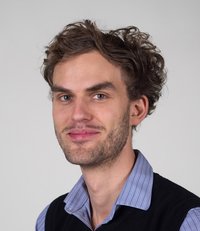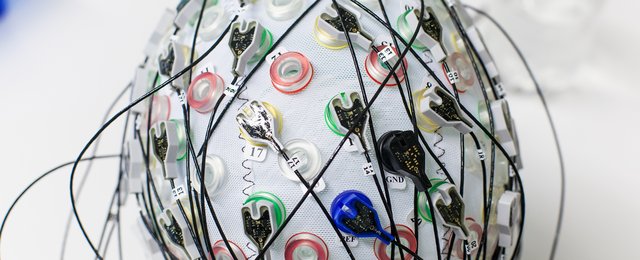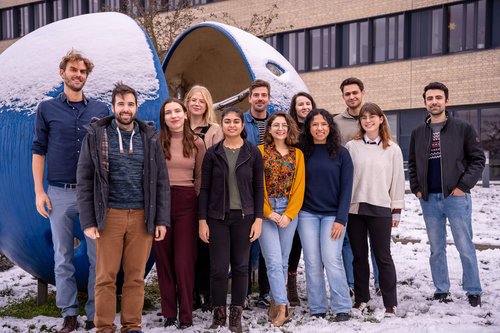Physiology of Motor Control
Throughout life, humans acquire precise, complex and flexible motor skills, e.g., when learning to use novel tools. We adjust these skills as the environment or our body changes, for example, when control over movements becomes restricted by paresis.
Our group studies how motor control and perception interact for motor learning, and how our subjective experience of control emerges from this interaction.
To this end, we combine novel, carefully controlled behavioural paradigms with non-invasive and invasive human electrophysiology. This includes magnetoencephalography and electroencephalography in healthy individuals in addition to intracranial and spinal recordings in patients with neurological disorders. We also study how aspects of motor learning and a subjective experience of control are altered in neurological and neuropsychiatric disorders, including hereditary ataxia, Tourette’s syndrome, obsessive-compulsive disorder and ADHD. For these patient studies we collaborate with the Departments of Neurology, Stereotactic Neurosurgery and Child and Adolescent Psychiatry.
Based on a thorough understanding of the underlying physiology, one long-term goal of our group is to develop targeted methods, e.g., non-invasive brain stimulation techniques, which improve motor learning and, thereby, could enhance clinical neurorehabilitation.
- Head
Head

Max-Philipp Stenner has been a Freigeist Fellow since 2018 and Junior Research Group Leader at the LIN since 2017. His research focuses on the control and subjective experience of human motor action. His dual academic roots, as a neuroscientist and clinical neurologist, are reflected in his scientific work, which spans basic sensorimotor as well as translational neuroscience. His work combines carefully controlled behavioural testing with non-invasive and invasive human electrophysiology in healthy individuals and patients with neurological or psychiatric disorders, including ataxia, Parkinson’s disease, Tourette syndrome, ADHD, and OCD.
Max obtained his doctorate in cellular and molecular neuroimmunology in 2012 (with Prof Heinz Wiendl, Julius-Maximilians-University Würzburg; summa cum laude). He has since shifted his research focus in accordance with his long-standing enthusiasm for systems-level neuroscience. Following a 3.5 year postdoc period at University College London (Wellcome Trust Centre for Neuroimaging; with Prof Raymond Dolan, and in close collaboration with Prof Patrick Haggard), Max first worked as a PostDoc at the Leibniz Institute for Neurobiology, in parallel to completing the neurological training part of his clinical specialization, before starting his own research group on the basis of his Freigeist fellowship. He is a principle investigator in a project of the CRC 779 (A03) as well as of a LIN Special Project. Besides his enthusiasm for neuroscience and neurology, Max is a passionate clarinetist.
- Members
Members
Head Dr. Max-Philipp Stenner +49-391-6263-92301 max-philipp.stenner@lin-magdeburg.de Postdoc Dr. Betina Korka betina.korka@med.ovgu.de PhD students Alexandros Karagiorgis (with AG Sensomotory) alexandros.karagiorgis@med.ovgu.de Anwesha Das (with AG Sensomotory) anwesha.das@med.ovgu.de Matthias Will +49-391-6263-92331 matthias.will@med.ovgu.de Medical doctoral students Anna Garibyan (Jena) Arda Altas Christoph Gärtner (with FG Neurocognitive Development) christoph.gaertner@st.ovgu.de Fabian Aurich (with FG Neurocognitive Development) fabian.aurich@st.ovgu.de Friederike Steinbrück friederike.steinbrück@st.ovgu.de Jana Klimpke +49-391-6263-92331 jana.klimpke@lin-magdeburg.de Jonas Luthe jonas.luthe@st.ovgu.de Lilli Otto lilli.otto@st.ovgu.de Masterstudents Cindy Marquez cindy.marquez@st.ovgu.de Alumni Bankim Subhash Chander Charitha Omprakash Fabio Dukagjini Izel Avci Jahangir Esfandiari Katarina Schmidt Maike Tilk Marius Keute Mohammed Istiaque Amin Punitha Achuthan Kalaiselvi - Projects
Projects
How do we predict consequences of our own actions?
This key project of our lab examines whether and how rhythmic electromagnetic fluctuations across large ensembles of neurons – neural oscillations – contribute to a fundament of our motor control, i.e., to the capacity for flexible prediction of the consequences of imminent motor commands. Our motor system constantly predicts consequences of its commands to the muscles – e.g., a change in velocity and position of the arm as we reach towards a light switch, tactile feedback when our finger starts pressing the switch, and visual feedback when the light finally turns on. These predictions are considered essential for smooth, spatially and temporally well-coordinated, precise, and flexible movements. Generating these predictions, however, requires sensorimotor integration. Neural oscillations could provide a key mechanism for this integration.
To test this, we are combining carefully controlled behavioural paradigms with non-invasive electromagnetic recordings in healthy individuals (magnetoencephalography, electroencephalography) and invasive recordings in neurological patients after surgical implantation of electrodes into the brain or alongside the spinal cord. These electrodes are implanted for purely medical reasons, more specifically, for medically approved, therapeutically effective electric stimulation, e.g., in the treatment of Parkinson’s disease or other neurological disorders. Incidentally, these medical procedures offer the unique opportunity to record electromagnetic signals from brain areas that are otherwise not accessible, without any additional risk for the patient. Furthermore, we are examining neurological patients with cerebellar dysfunction who have difficulty in predicting consequences of their own actions.
Our long-term goal is a detailed understanding of the role of neural oscillations for motor learning that can set the grounds for new therapeutic interventions, in particular electromagnetic brain stimulation techniques that target these neural oscillations and thereby influence their associated functions. Such techniques could provide new avenues for enhanced neurorehabilitation.
How do our own actions change how we perceive the world?
Our movements generate sensory input – as we extend our arm to turn on a light switch, sensors in our flexor muscles sense muscle stretch, as we touch the light switch, mechanoreceptors detect its impact on the skin, and as we move our eyes to explore the now well-lit room the image on our retina changes. How do our senses take into account that much of their input is the result of our own movements? Following the idea that the motor system predicts consequences of its own commands to the muscles, we examine how such predictions change sensory processing, again, with a focus on the role of neural oscillations, as well as the content and precision of our percepts. Furthermore, we examine whether and how movement places constraints on spatial encoding across multisensory input.
How do we experience our own movements, skilled or not?
Humans can become aware of what they are doing. In fact, we typically experience, subjectively, or at least implicitly assume full conscious control over whether or not we take action, and which action we take. Yet many highly skilled actions, such as playing an instrument or excelling at sports, feel most successful, or “smooth”, when we are unaware of the details of their motoric execution. All we seem to have in mind in these cases are their consequences, e.g., the music we are about to play. How then does our subjective experience of action relate to our actual control over our movements, from which information and by which physiological mechanisms is it created? We examine how our subjective experience of action changes as motor skill learning progresses, which physiological mechanisms characterize a transition from a subjective focus on motoric details to a subjective experience of their consequences, and how inquiring into motoric details aids or hampers motor learning, depending on how far learning has progressed. We are also interested in how a subjective experience of action is altered in neuropsychiatric disorders, in particular in Tourette syndrome.
- Current Third Party Funds
Current Third Party Funds
2021-2024
DFG grant (SFB 1436)
„Neural Resources of Cognition“2017-2022
Volkswagen Foundation grant (Freigeist Fellowship)
“Sensorimotor Rhythms for Internal Forward Modelling in the Human Brain”
http://portal.volkswagenstiftung.de/search/projectDetails.do?ref=92977
2016-2019
DFG grant (SFB 779)
„Neurobiology of Motivated Behavior“ (Project A03)
http://www.sfb779.de/en/a03.html
2016-2019
LIN Special Project
„Regulating Decision Thresholds via the Subthalamic Nucleus: A Translational Study” - Teaching & Internships
Teaching & Internships
We are offering a seminar on “Applied Neuroscience: Principles of Human Motor Control” to „Medical Systems Engineering“ students (Master).
In addition, we are teaching
- “Pathophysiology“ (seminar),
- "Critical Reading of Clinical Studies“ (lecture)
- “Neurological Emergencies” (seminar) and
- “Introduction to Clinical Medicine” (course) to medical students and are involved in medical students’ bedside teaching.
We welcome applications from students interested in a Masters’s or doctoral thesis, in particular from psychology, neuroscience, engineering, medicine and computer science.
- Open positions
Open positions
We are currently offering several positions:


